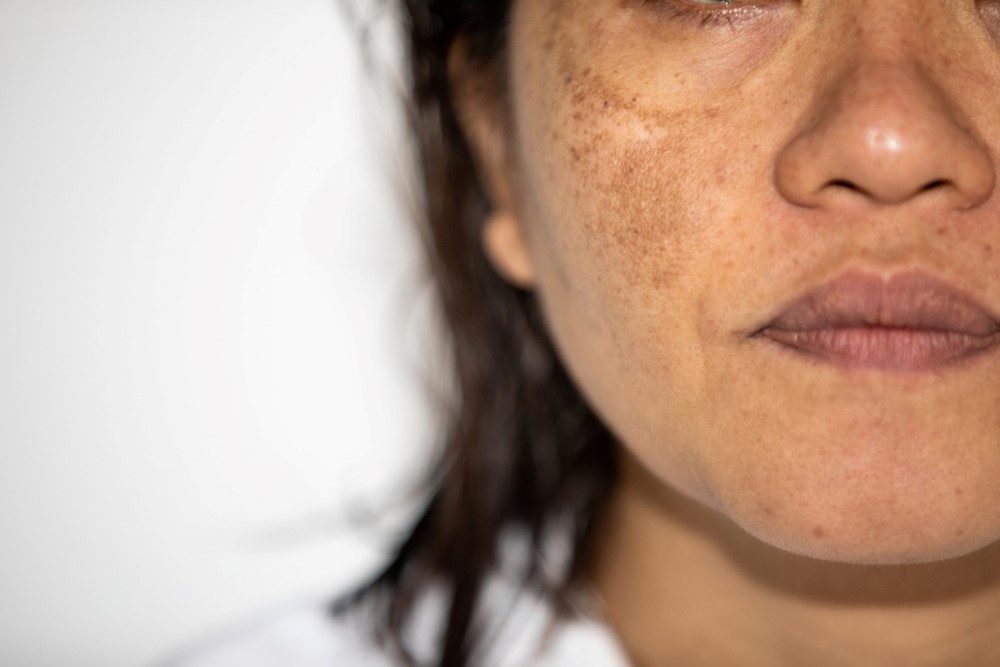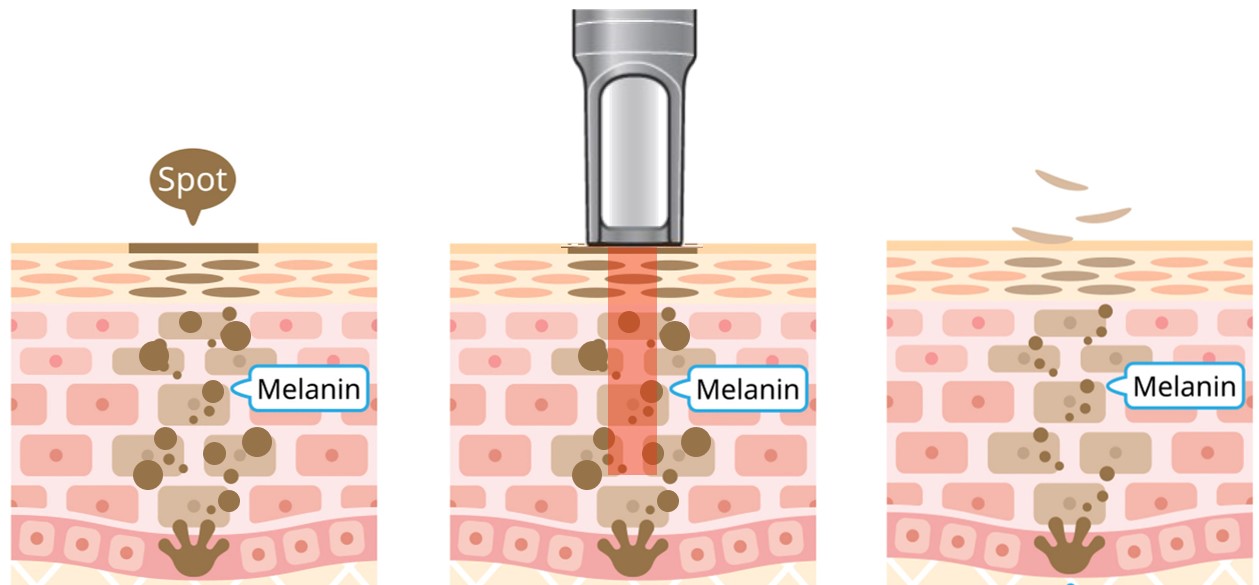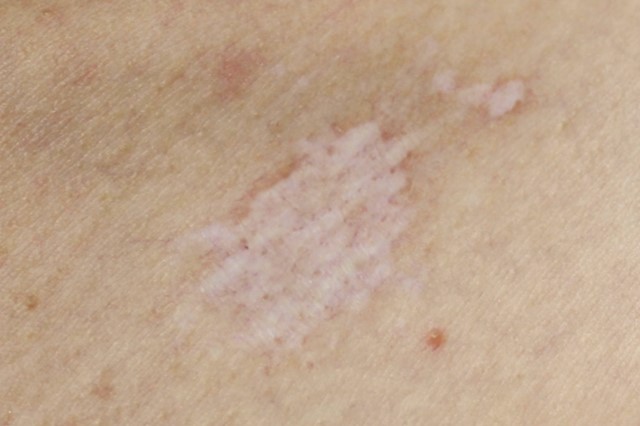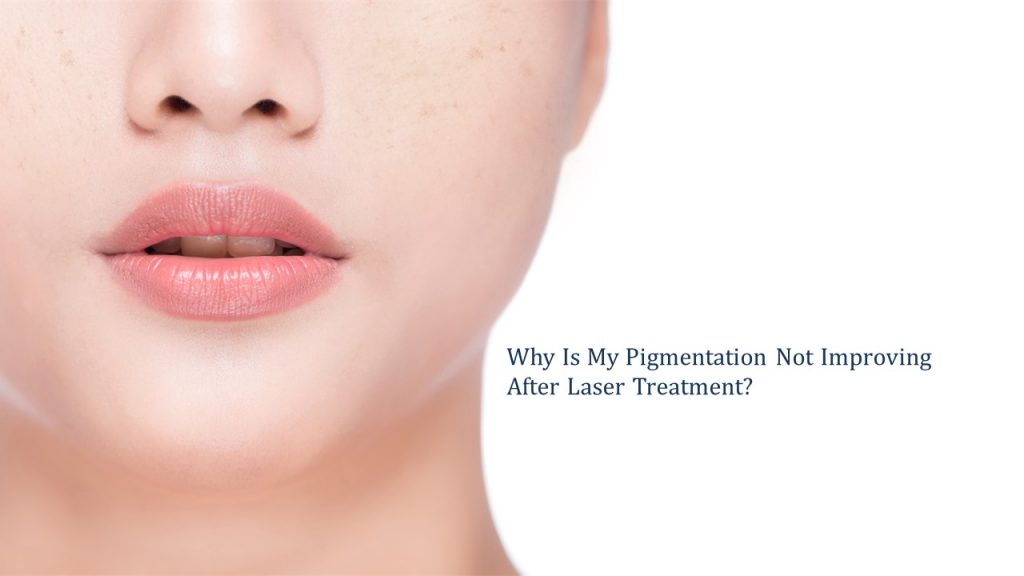Whatever your skin type is, there are many chances that you might get dark patches of pigmented skin at some point in your life. This is called pigmentation, and the culprit behind the whole phenomenon is a dark brown pigment called melanin which is naturally produced under the skin by melanocytes.
Types Of Pigmentation

Pigmentation has various types. The most common type is found commonly on the face and neck of light-skinned people and is known as freckles. Freckles are usually a harmless condition. Another type of pigmentation known as solar lentigines or age spots/liver spots develops due to exposure to intense sunlight for prolonged periods. Melasma, also known as chloasma, is common in women of childbearing ages due to hormonal imbalance. The spots have vaguely defined boundaries and are commonly found on the face. Melasma is very common occurring in pregnant women.
Rarely, pigmentation may also be a manifestation of an underlying disease process such as Addison’s disease.
Types Of Laser Treatments For Pigmentation

There are various types of laser treatments available for treating hyperpigmentation. The use of laser treatment is becoming very popular these days in Asian countries, particularly Singapore. The ease of carrying out this treatment, quicker results as compared to other oral and topical treatments as well as the accessibility for laser treatments has fueled its popularity.
Various types of lasers available for treatment for pigmentation are:
- IPL
- Medlite C6
- Alexandrite Laser
- Pico Laser
- Q-switched Nd-YAG
- Fraxel Laser
Although there are many laser treatment options, they are effective on different types of pigment concerns. Paring the correct laser to the skin concern is paramount to producing good results.
Why Is My Pigmentation Not Improving After Laser Therapy?
Getting rid of pigmentation is not an easy task. Pigmentation is a very common recurring problem, that returns even after a costly laser treatment. Getting good results after the treatment requires good care of the skin. Let us dive right into the reasons why treatments fail and pigmentation returns after some time.
Incorrect Diagnosis
Pigmentation has various types such as melasma, freckles, ephelides, and age spots. Each type of pigmentation requires a specific treatment approach for its eradication. Moreover, selecting the type of laser for the best possible treatment is also not an easy task.
Each type of laser treatment available for treating pigmentation relies on specific wavelengths. These wavelengths penetrate different depths of the skin to fragmentize pigmentation. Certain lasers also have an advantage over selected pigment colour. Depending on the nature of the pigment colour and depth the doctor will select the appropriate laser to use for treatment.
However, if a wrong diagnosis is made, the selection of laser may not address the concern effectively, leading to poor results which is a waste of both time and resources of the patient.
Insufficient Protective Measures Before Laser Treatment
Laser treatments procedure involves a variety of checkboxes to be filled before the treatment is carried out. Laser treatment largely depends on the condition and type of the patient’s skin. The patient has to undergo certain measures before the treatment, such as:
- The patient should not have exposed his or her skin to the intense sun for prolonged durations at least one week before the treatment.
- There should be no visible sunburns or inflammation in the area where the laser treatment will be carried out.
- The patient’s skin should be free of contact dermatitis.
- The patient’s skin should not be sensitive to light, as lasers involve treating the skin with intense bursts of light having various wavelengths.
- The patient should not have any history of exposure to skin lasers for the last 7 days before carrying out another procedure.
The efficacy of the laser procedure largely depends upon these prerequisites. If the patient is positive for any of the conditions listed above, laser treatment might not have the desired effect.
Faulty Procedure Of Laser Treatment
Lasers, being highly advanced technology, requires a lot of knowledge and prior experience for efficient operation. Advanced methods to treat hyperpigmentation which include chemical peels and lasers are undertaken by a certified doctors for a reason and they have the capability to damage skin if used inappropriately.

There are various types of lasers available to treat pigmentation, and each type of laser requires specific protocols during the procedure. The intense light bursts produced by the laser handpiece during the procedure produce a considerable amount of heat. Although the lasers target pigmented areas by using a precisely focused beam of light, insufficient expertise for this procedure might prove dangerous for the patient. The faulty procedure may result in skin burns due to inexperienced targeting. The skin burns are visible as lightened areas on the skin that differ in overall pigmentation in the surrounding skin. This is called hypopigmentation.
Inexperienced hands might also result in extreme scarring and redness of the skin in the concerned area. This later gives rise to post-inflammatory hyperpigmentation in the surrounding skin.
Insufficient Skin Care After Laser Treatment
Although laser treatment gets rid of hyperpigmented areas in a very short duration of time as compared to topical or oral medications, there is no guarantee that the pigmentation will never recur. The production of melanin is a natural process that is regulated by the genetic program of an individual and the amount of sunlight an individual is exposed to.
After having a laser treatment, your doctor might ask you to avoid direct and intense sunlight for at least 2 weeks. This is because the skin that is recently exposed to laser treatment is very sensitive. Intense sunlight can again trigger the skin to produce increased amounts of melanin in the area of concern, due to which the condition of hyperpigmentation recurs. That is why doctors emphasize using good sunscreen to protect sensitive skin from sun exposure in people who have an outdoor lifestyle.
Apart from prescribing sunscreens, your doctor might advise you on some topical formulations to restore the integrity of the skin after laser treatments. However, people often ignore these precautions due to which pigmentation recurs.
Conclusion
It is often said that prevention is better than treatment. If you are spending a considerable amount of your hard-earned money on undergoing laser treatment to get rid of hyperpigmentation, you must abide by the precautions advised by your dermatologist. There is currently no treatment for hyperpigmentation that guarantees permanent eradication of pigmented spots. Moreover, it is necessary to choose a certified dermatologist to carry out the treatment for achieving the best possible results.
About Dream Aesthetics and Plastic Surgery
Bespoke surgical for cosmetic or medical reasons is what Dream covers to bring out the beauty in every individual. Going beyond the aesthetics and working on physical anomalies are what we value the most in leading our patients to cherish self-improvement and confident lifestyles.
Derived from Associate Professor Vincent Yeow’s long-standing experience performing plastic surgery in Singapore, our treatment plans deliver physical remodelling in our patients’ favour. One of the notable remodellings is droopy eyelid correction. The ptosis surgery used for treatment eventually fixes drooping eyelids, improves vision and enhances appearance.
Most importantly, as a trustworthy plastic surgery and aesthetic clinic, we treasure positive and natural outcomes for each individual. We will ensure to deliver the beauty refinement of your dream without compromising your safety and privacy.







